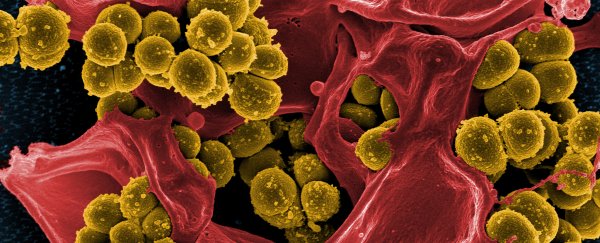Researchers have created a device that can diagnose 1,000 pathogens in just six hours, and it could change the way doctors fight disease.
Called IRIDICA, the device is pretty radical. Right now, when doctors want to diagnose a disease, they need to take a patient's blood sample and separate it into lots of different tubes to be individually tested for particular pathogens.
This means that if someone has a pathogen that the doctor isn't looking for, they're not going to find it. It also means the whole process of diagnosis is slower than it needs to be.
But over the past 15 years, researchers have been working on IRIDICA, in the hopes that they could use it to monitor any blood sample and find out what was lurking inside. Their device has now been commercialised by pharmaceutical company Abbott.
"Everyone was asking the wrong questions, taking existing technology and making individual tests for diseases. But with over 1,000 organisms causing disease in humans, you can't make 1,000 tests," Dave Ecker, one of the four researchers who came up with the idea, told Ariel Schwartz from Co.Exist.
"So we asked: Can we use our technology to say 'Give me a specimen and I'm going to tell you what infectious organisms are in it no matter what they are?'"
The device works by separating genetic material (both the sick human's and the pathogen's) from a patient's blood. The genetic material from the pathogen is then isolated and copied, so the machine has a larger sample to work with.
This genetic material then goes into a mass spectrometer to work out the molecular weight of the pathogen. Each base pair of DNA - adenine (A), guanine (G), cytosine (C) and thymine (T) - weighs a different amount, so by determining the total genetic weight, scientists can then work out the number of different base pairs the pathogen in the blood sample has. Using that information, they can identify what the patient is infected with.
The whole process takes roughly six hours, using the set-up below.
While it will be useful for diagnosing all kinds of bacterial, fungal and viral infections, including Ebola, the researchers behind the project think it will be particularly helpful when it comes to working out the cause of sepsis - an infection that can kill someone within 15 hours, often without scientists ever knowing the microbe that caused it.
It will also greatly help speed up fungal pathogen diagnosis - right now scientists can wait months while a fungus sample grows in the lab to a large enough size to be tested.
IRIDICA has just received the CE-Mark approval in Europe, which is the equivalent of the US's FDA approval, and the company is now starting clinical trials in the US.
Source: Co.Exist

